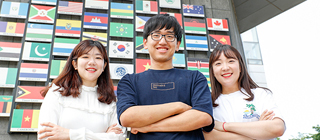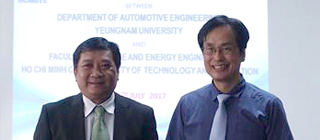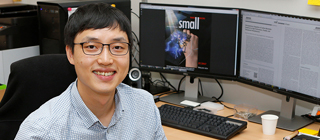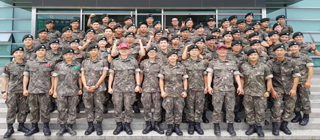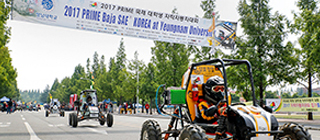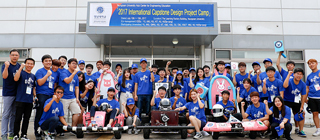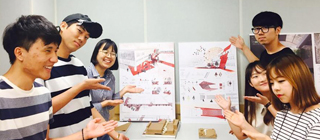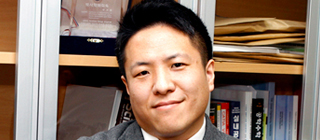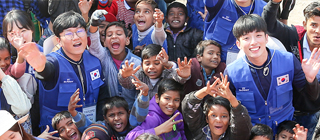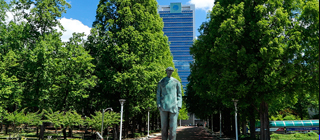-
Selected 29 students from 16 universities in Korea and abroad such as New York University to be dispatched to the UN Headquarters in New York in August Three YU students selected, thus receiving recognition for global capacities "Want to discuss international issues with experts and working-level staff of different countries to gain experience in international activities" [July 25, 2017] <YU student selected as Korean college student representatives to the UN Headquarters in New York> (from left to right: Yoon Soo-hyun, Jung Si-young, Heo Dong-hwa) Three YU students will be dispatched to the UN headquarters as Korea college student representatives. The World Federation of United Nations Associations selected the 'UN Headquarters Korean College Student Representatives' and will dispatch them to the UN Headquarters from August 21 to 25. Three YU students were included in the 'UN Headquarters Korean College Student Representatives'. The YU students are Jung Si-young (25, College of Pharmacy, junior), Yoon Soo-hyun (24, Department of Cultural Anthropology, senior), and Heo Dong-hwa (23, Department of Saemaul Studies and International Development). A total of 29 college students from 16 universities in Korea and abroad such as New York University, Columbia University, Furman University, Korea University, Yonsei University and Hanyang University were selected. Heo Dong-hwa, who majors in Saemaul Studies and International Development said, "I want to utilize my major and after graduating, work with a non-profit institute or international organization engaged in ODA. I am very excited about this opportunity to go to the UN Headquarters." He added, "I have been interested in the health and medical field ever since I was in high school in the United States. During my visit to the UN Headquarters, I hope to speak with many hands-on workers on the duties and assignments of various fields. Furthermore, I want to come back with a lot of information such as whether it fits the career path I am looking for." The representatives are scheduled to group up into teams based on themes such as urban development and sustainable development to collect data and make presentations, and share their opinions with local hands-on workers at the UN Headquarters. Yoon Soo-hyun stated, "I visited the UN Headquarters during my six month language program in New York. I am preparing a lot despite the fact that it will be short because this is not just a trip or visit, but I am an official representative." She added, "As this is an opportunity to actually experience what happens at international organizations while meeting with people from around the world including UN workers, I will make a lot of preparations and learn as much as possible." The representatives will learn and experience 'UN's various and specialized structure', 'major agendas', and 'overall understanding and critical thinking on multi-party decision-making procedures' under the theme of 'UN Sustainable Development Goals' that will be the development index of the entire world by 2030, and are anticipated to train their capacities to gain a foothold for international activities. Jung Si-young, who is also preparing for as a member of the representatives, said, "I applied to join the representatives because I wanted to experience in person what exactly the UN, which is a highly known international organization, does. I feel that my English is not as good as the rest of the representatives so I am concentrating on studying English for now." She added, "I have high expectations as the majors of the other students are diverse and because I will be able to meet with workers from various countries at the UN Headquarters in New York. I hope that I will be able to speak about various international issues with them, hold discussions, and learn and experience the perspectives of various people."
-
Pledged to gather capacities of the two institutes to improve education, research and academic exchange for departments related to automobiles Goal to foster talented human resources for the future automobile engineering sector [July 21, 2017] The YU Department of Automotive Engineering and Vietnam's Ho Chi Minh City University of Technology and Education Department of Automobile and Energy Engineering agreed to work together to foster talented human resources in the automobile engineering sector. On the 20th, YU Department of Automotive Engineering Dean Hwang Pyeong (right on photo) visited the HCMC University of Technology and Education in Vietnam and met with the university president Do Van Dzung and Department of Automobile and Energy Engineering Huynh Phuoc Son (right on photo) to sign an MOU. With this agreement, the two universities agreed to work together to seek for cooperation plans according to joint research, cyber lectures, the Asian University Network's engineering certification program, and the Accreditation Board for Engineering Education of Korea (ABEEK) program, for student and professor exchange and exchange systems for fostering human resources in the future automobile engineering sector. YU Department of Automotive Engineering Dean Hwang Pyeong said, "Professors who earned their degrees at YU and gained technological and research capacities in Korea are currently fostering students at the HCMC University of Technology and Education, and it is therefore expected that there will be synergy effects for fostering specialists in automobile engineering." There are currently three professors who earned their PhDs at the YU Graduate School of Mechanical Engineering at HCMC University of Technology and Education. Two of them are vice-deans and one is the dean, thus showing that they hold key positions at this university. They are currently passing on their knowledge and experience in engineering that they picked up at YU and Korea for young talents in Vietnam. HCMC University of Technology and Education President Do Van Dzung who was also present at the MOU signing ceremony said, "I hope that in addition to cooperation and exchange in the automobile engineering sector, we can have a more comprehensive MOU for various other academic fields." The HCMC University of Technology and Education was founded in 1962 and is a public university with 20,000 students. Thanks to the development of Vietnam and its rapid growth, the employment rate of graduating students is approximately 98%, and its educational performance has thus been recognized. The main facilities of the university were built with the support of Australia, Japan, Germany, Australia, etc., and it is currently receiving support from 'USAid', which is an American government institute in charge of foreign aid of the US. At the MOU signing ceremony held at the HCMC University of Technology and Education in Vietnam, YU School of Mechanical Engineering Professor Kim Byung-il explained the 'Development of the Korean Automobile Industry and NVH (Noise, Vibration, Harshness) Research', and received huge responses. Vietnamese students asked many questions about Korea's automobile industry and technologies, and about studying at YU.
-
Developed 'high performance flexible/transparent patch-type optical sensor' using carbon nano-materials and organic matter Published as cover paper for the latest issue of 'Small', a global academic journal in the nano-material sector Expected to be used as an 'advanced electronic device for the health and cosmetic sector' that can be attached to the human body [August 7, 2017] YU School of Mechanical Engineering Professor Choi Jung-wook (33, photo) is receiving attention from the academic circles for developing a high performance patch-type optical sensor. Optical sensors are elements that convert light into electric signals. It is used for measuring physical quantity such as the wavelengths and intensity of light, but also in a variety of other fields such as information processing, optical communication, and the medical field. There has recently been many studies being conducted to develop flexible optical sensors with the development of flexible electronic devices. However, electrodes, which are major elements that comprise sensors, are comprised of opaque or easily broken materials such as metals or indium oxides and therefore have limitations in being used for actual flexible sensors. The research team used carbon nano-materials and organic materials that react sensitively to light to develop patch-type optical sensors with excellent flexibility, elasticity and transparency. The results of this study, which was carried out as a joint research with the Yonsei University Professor Kim Jong-baek's team was published as the cover paper (see cover below) of the latest issue (Jul 19, 2017) of the world-acclaimed academic journal <Small> (impact factor (IF) 8.643). Professor Choi said, "As a substance in charge of photosynthesis for plants and 'carbon nano-materials', which is a new material that has recently received huge attention, this is the first case to develop highly sensitive optical sensors that are transparent and elastic by creating an integrated structure of porphyrin that generates electric signals by reacting to light." The research team created a transparent and elastic optical sensor that uses graphene as the electrodes in carbon nanotube channels that can act as semiconductors. Carbon nanotubes and graphene are substances made up only of carbon. In addition to the very small size at nano-meter units and its excellent intensity, it has outstanding physical and chemical properties, and therefore, research on developing highly flexible electronic devices using these are actively under way. However, carbon nano-materials have extremely low light reaction, making it difficult for use as an optical sensor. Professor Choi said, "Porphyrin was functionally treated on the carbon nanotube to overcome the low light reactivity of carbon nano-materials. Accordingly, it was possible to change the electric characteristics of carbon nanotubes and detect the intensity of light. The sensors developed here are comprised of only elements that are transparent and has very small changes in properties due to mechanical changes, and it was thus confirmed that it was possible to measure light without reduced performance even after repeated bending." Professor Choi said, "It is expected that the development of patch-type wearable devices that are attached on the human body will become more active in the near future. The optical sensor developed by us is very thin and transparent. The weight and volume was reduced greatly and so it is easy to attach on the skin." He added, "It can not only be used as an advanced electronic device in the health and cosmetic sector, but will also be able to bring forward the distribution of practical elements based on carbon nano materials." Professor Choi earned his PhD in mechanical engineering at Yonsei University and completed his post-doctorates at Purdue University in the United States and began serving as a professor at YU from 2016. His main field of research is the micro electro-mechanical systems and he mainly focuses on research in ultra-small energy conversion elements and wearable electronic devices using nano-materials, as well as sensors and nano-compound materials.
-
56 in first basic training for the summer of 2017, 3rd place in the 110 ROTCs nationwide Since the establishment of the YU ROTC in 1968, a total of 5,147 officers from 56 classes Opened Department of Military Studies through an MOU with the Army in 2011, offering four year scholarship and guarantee to become officer [August 1, 2017] <YU ROTC cadets participating in the 1st summer basic training of 2017> The YU ROTC (Director Colonel Lee Joo-hwan) is exhibiting outstanding capacities in the ROTC cadet summer basic training that began during the summer break. Basic training is a military education received for a total of 12 weeks (2 weeks in the winter and 2 weeks in the summer for juniors and seniors) where ROTC cadets enter the ROTC school during summer and winter breaks based on the knowledge they learned in school. In the 1st summer basic training of 2017 conducted at the ROTC School located in Gwesan, Chungbuk with the start of summer break on June 26, a total of 56 ROTC cadets including Cadet Song Geun-seong (22, Business Administration, senior) joined. At the first training up until July 21, the YU ROTC was selected as the 'overall best ROTC'. 'Best overall ROTC' is given to the top three corps among the 110 ROTCs around the nation (52 colonel-level ROTC). Together with YU, Seoul National University and Ulsan National University were also selected as overall best ROTCs. YU President Sur Gil-soo said, "I believe that their diligence in their studies during the semester led to such great outcomes at the basic training. I am proud as the president of the university." He added, "I trust that as the cadets did not rest during vacation and worked harder than everyone else, they will become excellent officers who lead by example and exhibit patriotism after they are commissioned." The YU ROTC also had award winners in basic military education courses per service sector such as the Infantry School among the cadets that were commissioned this year. Among the 62 cadets of the 55th YU class commissioned in 2017, seven won awards at the Infantry School, Armor School and Field Artillery School, thus exhibiting their exceptional combat readiness. In 1968, YU integrated and launched the '121st ROTC'. A total of 5,147 from 56 classes were commissioned as officers, and there are currently 114 people (including six female cadets) enrolled as ROTC cadets. In 2010, it was selected as the pilot school for female ROTC and has up until now graduated 27 female officers. In March 2011, it opened the first Department of Military Studies in the Daegu-Gyeongbuk region through an MOU with the Army. The quota per grade is 40 and all students are given military scholarships from the Army and are exempted for four years of tuition. They are guaranteed to be commissioned as officers upon graduation.
-
‘2017 PRIME Baja SAE Korea' Ends in Huge Success From 13th to 15 at the YU Gyeongsan Campus, 34 teams from 24 universities of Korea and abroad competed YU's 'YUSAE 16' team takes home overall best, first place for second straight year [Jul 15, 2017] <'2017 PRIME Baja SAE Korea' Car Parade> The PRIME Baja SAE KOREA at Yeungnam University 2017 completed a passionate three day schedule and closed its curtains on the 15th. This year marks the 22nd anniversary and was joined by three universities from abroad including Rajamangala University of Technology Thanyaburi and Chulalongkorn University of Thailand, and Singapore Polytechnic, as well as Chungnam National University Korea University of Technology and Education, Korea Aerospace University, and Hongik University for a total of 34 teams from 24 universities from Korea and other parts of the world to take part in a passion-filled race. <'YUSAE 16' team that won best overall> Lee Gyu-ik (21), a sophomore at Keimyung University Department of Mechanics and Automobile Engineering, who participated in this event as the driver for the 'Speeding' team, said, "This is the third time I am participating in this event following 2014 and 2015. I've taken part in various self-made automobile competitions not only at YU, but also in the US and in Gunsan. However, Baja SAE Korea held at YU has the best off-road track. It is a shame that compared to the excellent infrastructure, there are not that many participating teams. I hope that next year more students will participate and create a festival for everyone." He added, "I've finished my military service so I am now starting to study my major in earnest as a sophomore and I am highly interested in the automobile design field. My experience participating in self-made automobile contests for several years will help me greatly in studying my major." At this year's competition, the YU 'YUSAE 16' team took the overall best award and received the Minister of Trade, Industry and Energy Award, a trophy, winner's flag and a cash prize of 3 million won. 'YUSAE 16', which is a team comprised of students in the YU self-made automobile club 'YUSAE', won the event for two straight years now once again demonstrating that it is the top in self-made automobile competitions. Second place overall went to the ‘S.E.C-TU’ team of Tongmyung University, and third place went to the 'Dynamics' team of Hannam University. <Participants preparing for the static test> At 9 a.m. on the 13th, which was the first day of the event, the participants completed their registrations and then proceeded with the static test to check the creativity of the automobile design, structural safety, driver convenience, ease of maintenance, and potential for mass production, and also held basic braking tests and rule meetings late into the evening. <Dynamic test> In the morning of the 14th, with the attendance of all of the participating teams, volunteers, sponsors, etc., the official opening ceremony was held and the participating teams held a car parade at the main field and roads near the school. In the afternoon, dynamic tests on acceleration, top speed, and rock climbing were held. On the last day of the 15th, the durability test, which is the highlight of the event, was held at a 3.5km long off-road track at the mountain behind the YU water purification center. <'Durability test', the highlight of the competition> YU Department of Automotive Engineering Professor Hwang Pyeong, who was the chairperson of the event, said, "I am convinced that the students will have experienced and felt many things while running around in the hot weather and taking part in the automobile design, production and operation." He added, "Regardless of the results and rankings, the theories they learned in the classroom and the on-site experience through this contest will be valuable assets to students." The 'Baja SAE Korea' is a contest in which college students demonstrate automobiles that they made and first began in 1996. In 2001, it received approval from the US SAE for the first time in Korea and has become an international event and is being held annually at YU. The results are announced to the entire world through the official homepage of SAE (www.sae.org) and publications.
-
'International Capstone Design Project Camp 2017' hosted by the YU Engineering Education Hub Center Engineering students from three countries such as Singapore, Thailand and Korea work together for creative comprehensive design for international cooperation [Jul 14, 2017] <Participants of the International Capstone Design Project Camp 2017> The 'International Capstone Design Project Camp 2017' in which college students from Korea, Singapore and Thailand gathered to make an actual self-driving electric vehicle was held at YU. YU hosted the 'International Capstone Design Project Camp' in 2013 for the first time in Korea and has been hosting the event ever since celebrating the fifth year this time around. 'Capstone design', which means 'creative comprehensive design' aims at fostering engineers with practical abilities and creativity. This is an engineering education program that allows students to design, produce and evaluate products needed in industries based on the knowledge they acquired in their respective fields in order to enhance their creativity, practical abilities, teamwork, and leadership. This camp, which was held from the 10th by the YU Engineering Education Hub Center (Director Song Dong-joo) will be held for six days until the 15th. At this camp, 64 students from 16 universities including three foreign universities such as Rajamangala University of Technology Thanyaburi and Chulalongkorn University of Thailand, and Singapore Polytechnic participated. The participants were mixed by university and major into four teams to complete their assignment. The theme of this camp was 'self-driving electric automobiles'. Self-driving electric automobiles use existing electric motors and combine it with a self-driving system using Arduino sensors, etc. Each team will listen to lectures related to self-driving electric automobiles and then design and produce an actual vehicle. The teams were made up in advance before the camp started to share opinions and decide on their concept in order to perfect their work during the short period of the camp. Kim Jin-woo (23, Halla University) who was the team leader of C Team comprised of students from Thailand, Singapore, Halla University, Hongik University and Keimyung University said, "This was a valuable experience as we were able to apply the theories that we learned in class and utilize our teamwork to produce a self-driving electric vehicle, which has become one of the biggest issues in the automobile industry." He added, "I believe that the opportunity of joining teams with students from different countries and regions and who have different majors to approach the task from various viewpoints will be very helpful in my future studies. I really hope to be able to participate in this camp again next year." Participating students listened to theoretical lectures every morning at 9 a.m. and then went on to the workshop, while also building their own vehicle in a very tight schedule. On the morning of the 14th, which is the fifth day of the camp, the students held a car parade with their self-made self-driving electric vehicles at the 'Baja SAE Korea 2017' opening ceremony. YU Engineering Education Hub Center Director Song Dong-joo (Professor of mechanical engineering) who supervised this camp said, "This is the fifth year of hosting this camp and the student's levels and abilities are continuously rising. Staying up all night during the camp and working hard on their project will be a great experience for the future of the students." He also stated, "This year, the project integrated self-driving and electric vehicles. I hope that through this camp, the university will be able to cooperate in industry-academic projects with the automobile and IOT industries, which is the main industries of this region."
-
Held workshop on 'environment-friendly material soil meets advanced technology' Architecture workshop during summer vacation held for the 10th straight year since 2008 Alumni architects working abroad and domestic and foreign college students participate to take part in architectural tests and discussions for 6 days [Jul 14, 2017] <The 'architecture workshop' is being held for the 10th straight year to help improve the capacities of students in the School of Architecture> The YU School of Architecture is working hard to improve the capacities of students in their majors by holding architecture workshops regularly for the 10th consecutive year. In order to offer special experiences and knowledge that are hard to deal with in the regular curriculum, the School of Architecture has been holding architecture workshops every summer vacation since 2008. The workshop was carried out by inviting alumni architects working abroad to serve as tutors. As time passed, it developed into an 'architecture workshop' joined by experts and college students from Korea and abroad. <Architecture Workshop Group Practice and Presentations> At this workshop, which marks its 10th year, students from the YU School of Architecture and 36 students who applied around the nation participated. At the workshop held at the Architecture Hall for six days from July 3 to 8, professors in different areas of architecture and architecture students who will be responsible for the future of architecture gathered to conduct experiments and hold discussions on various topics related to architecture, and also took the time to present their group's final output from the workshop. Kang Kyu-won (YU School of Architecture, junior), who participated in this workshop, said, "It was a short time, but it was a valuable opportunity to be able to experience the new trends of architecture." <Final presentation of outcomes from the architecture workshop> In particular, Professor Park Dae-gwon was invited for this workshop. Professor Park joined the YU School of Architecture in 1998 and earned his degree at Harvard University, and is currently working at a prestigious private university of America, Syracuse University. Professor Park used soil, which is an environment-friendly material, for the theme of 'Future of Traditional Soil Architecture' and attempted various procedures to realize nonlinear architectural spaces and formats using digital architecture methods. The participating students grouped up into six teams and set their locations in and outside of the architecture hall to devise nonlinear devices, and made their own models using a 3D printer. Professor Park Sang-min of the School of Architecture who planned and supervised this workshop said, "Nonlinear architecture is an important topic for future architecture and it has unlimited growth potential by combining with 3D printing technologies. This workshop themed on soil should have been very helpful to students." He added, "I hope that the architecture workshop, which is the pride of the YU School of Architecture, will be able to develop even further next year."
-
Second Korean to win this award Contributions by presenting new research direction for the aerosol sector, published over 70 papers in international journals Selected as 'young scientist' who achieved excellent research performance [Jul 20, 2017] YU School of Mechanical Engineering Professor Byun Jung-hoon (38) won the 'AYASA (Asian Young Aerosol Scientist Award)’ award. This is the second time in history for a Korean to receive this award. AYASA is an award given to young scientists (under 40 years of age) who made extraordinary research achievements in the field of aerosol (small solid or liquid particles suspended in the air, normally around 0.001 to 1.0 ㎛ and recently it has been called 'fine dusts'). Winners of the award are selected once every two years by the AARA (Asian Aerosol Research Assembly). At the '2017 Asian Aerosol Conference' held at the Jeju International Convention Center on the 5th, Professor Byun received the AYASA award. Professor Byun said, "It is an honor to be recognized for my research. This was possible due to the various professors who encouraged me and contributed to my research." Professor Byun published over 70 papers as the main author regarding research on aerosol in the world's best international journals and also made extraordinary research achievements in the aerosol sector such as registering dozens of patents. In particular, he was recognized for his contributions by suggesting new research directions in the aerosol field such as the 'aerosol organic-inorganic particle production technology' for the first time in the world, 'aerosol-hydrozol phase change technology', 'aerosol photoinduction synthesis technology', and 'aerosol catalyst activation technology'. Professor Byun said, "I received offers for various activities by 'Aerosol and Air Quality Research', which is the world leading journal of the aerosol field. I am planning to stay active in various fields for the development of research in aerosol, while preparing for my invitational thesis." He added, "I am currently researching the positive value creation of aerosol such as the biomedical and eco-energy application of aerosol. I will make more valuable research achievements through not only joint research, but also by creating a proprietary field of research in the aerosol sector."
-
Over 400 students go abroad for overseas volunteer corps, overseas internships, backpacking, etc. Overseas field trip related to majors, advanced industry field trips, and other diverse programs [July 6, 2017] <33rd YU Overseas Volunteer Corps launching ceremony> During summer vacation, YU students will be even busier during the school semester. YU students will be travelling all around the world through various global capacity strengthen programs during the summer break. YU offers various overseas programs during the vacation periods every year. Over 400 YU students will be travelling around the world during this summer break as well. The 'overseas volunteer corps' in which 2,490 students participated in over a total of 32 sessions since 2001 is one of YU's most representative overseas dispatch programs. This summer as well, YU will dispatch 40 people in the 33rd overseas volunteer corps to Mongolia and Laos. They held the launching ceremony at the YU College of Education at 3 p.m. on the 5th, and will be dispatched to their respective nations in July and offer volunteer services for two weeks. <Volunteer activities in India by the 32nd overseas volunteer corps> The volunteer corps dispatched this time will visit local elementary schools and offer volunteer services for education and environmental improvement. During the volunteer period, in addition to repairing old facilities, painting the walls, etc. at the elementary school, they will also engage in educational volunteer activities by organizing various teams such as arts and physical education. In particular, they will also spread Korean culture through taekwondo lessons and traditional games such as yutnori. Kim Yeo-won (23, Department of Psychology, junior), who is the team leader of the Mongolia team of the 33rd overseas volunteer corps, said, "I traveled Inner Mongolia in China in 2014 for about a week. I had a great experience there so I applied to volunteer at Mongolia, which shares a similar culture." She added, "This will be an opportunity to interact with locals more, learn new cultures, and broaden my horizons compared to when simply traveling." One of the most popular programs among students among the overseas dispatch programs offered by YU is 'Window To the World'. 'Window To the World' is a popular backpacking program where students make teams and set a theme. The selected students are offered round-trip airfare by the school. Since beginning first in 2002, approximately 2,300 students traveled the world. This summer break, 99 students will make up teams of twos and threes to go backpacking around the world such in Europe, USA, Australia, Japan and China. 'OPP' (Outbound Pilot Program) is another overseas dispatch program funded and boasted by YU. This is a preliminary short-term language program for students who are interested in studying abroad or to go to foreign sister schools as exchange students. OPP, which first started in 2009, was joined by a total of 1,640 students up until now. This summer, 68 students will go to Guam for four weeks through the OPP. The overseas internship program where students work at a foreign company overseas for six months to one year will also have about 20 students go to the US and Hong Kong this summer. The overseas internship is a program that is also linked to school credits, so students will be able to kill three birds with one stone through this such as experiencing global cultures, gaining hands-on experience at companies, and earning school credits. In addition, over 180 students will be dispatched abroad to England, Canada, China Japan, etc. through programs such as exploring advanced industries, short-term overseas internships, overseas field trips related to majors, short-term language programs, and exchange programs with overseas universities, and thus a total of over 400 YU students will be travelling around the world this summer break.
-
Only private university outside of the Seoul area to be in the top 10 Hankyung Business Weekly analyzed CEOs of top 100 companies, 3 from YU [July 5, 2017] Alma Mater of CEOs of Top 100 Companies of Korea (Bachelor's Degree) Rank University No. of CEOs 1 Seoul National University 35 2 Korea University 15 3 Yonsei University 8 4 Sungkyunkwan University 5 4 Hanyang University 5 6 Hankuk University of Foreign Studies 4 7 Yeungnam University 3 7 Sogang University 3 7 Chungang University 3 10 Dongguk University 2 10 Kyunghee University 2 10 Chungnam National University 2 ※Analysis results by Hankyung Business Weekly YU (President Sur Gil-soo) was ranked seventh in the nation for universities that graduated the CEOs of the top 100 companies leading the Korean financial world. This is the only private university outside of the Seoul area that was placed in the top 100. Hankyung Business Weekly and NICE Information Service recently picked out the top 100 companies of Korea and analyzed the age and academic background of their CEOs. In result, YU was found to have graduated a total of three CEOs, placing seventh together with Sogang University and Chungang University. Seoul National University was highest with 35, followed by Korea University (15), Yonsei University (8), Sungkyunkwan University and Hanyang University (5), and Hankuk University of Foreign Studies. Meanwhile, YU was also placed eighth in the nation as the alma mater for CEOs of Korea's top 500 companies reported by CEO Score, a corporate management performance evaluation site, in April. Also in the '2017 KOSDAQ Listed Corporation CEO Survey' announced the KOSDAQ Association, YU was placed sixth in the nation for the alma mater of KOSDAQ CEOs, thus reconfirming the alumni power of YU.
